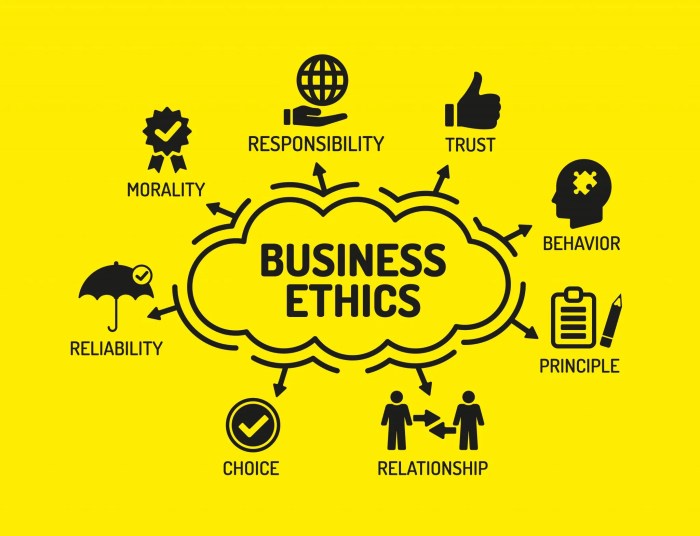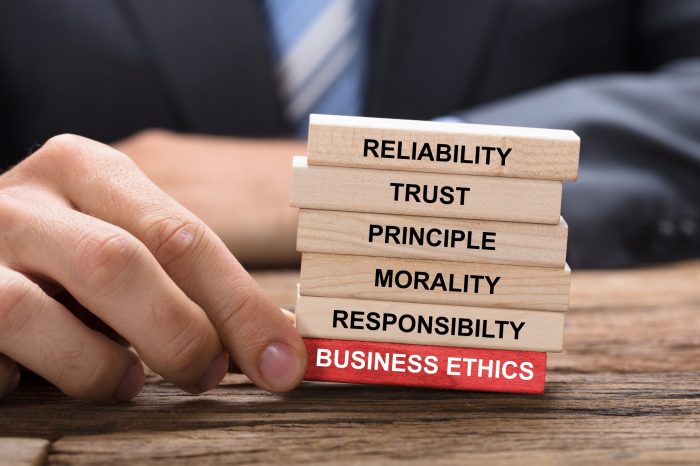Business ethics sets the tone for ethical decision-making in the corporate world, exploring dilemmas, leadership, and social responsibility with a fresh perspective. Get ready for a deep dive into the complex world of ethical business practices.
Overview of Business Ethics
In today’s fast-paced corporate world, business ethics play a crucial role in shaping the decisions and actions of companies. Business ethics refers to the moral principles and values that guide the behavior of individuals and organizations in the business environment. It is essential for companies to uphold ethical standards to maintain trust with customers, employees, and stakeholders.
Importance of Business Ethics
- Ethical behavior helps build a positive reputation for a company, leading to increased customer loyalty and trust.
- Adhering to ethical standards can enhance employee morale and productivity, creating a positive work culture.
- Business ethics can help companies avoid costly legal issues and regulatory penalties.
- Ethical practices contribute to long-term sustainability and success by fostering strong relationships with stakeholders.
Role of Ethics in Decision-Making
Ethics play a crucial role in decision-making within a business environment by guiding leaders and employees to make choices that align with moral values and principles. When faced with ethical dilemmas, companies must consider the potential impact of their decisions on various stakeholders, including customers, employees, suppliers, and the community.
Examples of Ethical Dilemmas
- Conflict of interest: When employees are in a position to benefit personally from their decisions at the expense of the company.
- Environmental responsibility: Companies facing the dilemma of prioritizing profit over environmentally sustainable practices.
- Employee treatment: Decisions regarding fair wages, working conditions, and employee rights can present ethical challenges for companies.
Ethical Leadership

Ethical leadership is crucial in setting the tone for a company’s culture and values. It involves leading by example, making decisions based on moral principles, and prioritizing the well-being of employees and stakeholders.
Characteristics of an Ethical Leader
- Integrity: Ethical leaders act with honesty and transparency in all their dealings.
- Accountability: They take responsibility for their actions and decisions.
- Empathy: Ethical leaders show compassion and understanding towards others.
- Fairness: They treat all individuals with equality and justice.
- Vision: Ethical leaders have a clear vision for the future and inspire others to follow.
How Ethical Leadership Influences Organizational Culture
Ethical leadership can greatly impact the culture of an organization by fostering trust, loyalty, and respect among employees. When leaders prioritize ethics, it creates a positive work environment where employees feel valued and motivated to perform at their best.
Examples of Companies with Ethical Leadership Practices
- Patagonia: Known for its commitment to environmental sustainability and fair labor practices.
- Salesforce: CEO Marc Benioff is a strong advocate for diversity, equality, and philanthropy.
- Microsoft: Under the leadership of Satya Nadella, the company has prioritized ethical AI development and community service initiatives.
Corporate Social Responsibility (CSR)
Corporate Social Responsibility (CSR) refers to a company’s commitment to operating ethically and contributing to the economic, social, and environmental well-being of society. It involves taking responsibility for the impact of their activities on customers, employees, communities, and the environment.
Benefits of Integrating CSR into Business Practices
- Enhanced Reputation: Companies that engage in CSR initiatives often build a positive reputation and gain the trust of consumers.
- Increased Employee Engagement: CSR activities can boost employee morale and loyalty, leading to higher productivity and retention rates.
- Cost Savings: By integrating sustainable practices, companies can reduce waste, energy consumption, and other costs in the long run.
- Attracting Investors: Investors are more likely to support companies that prioritize CSR, as it demonstrates a commitment to long-term sustainability.
Examples of Companies Excelling in CSR Initiatives, Business ethics
1. Patagonia: Known for its environmental initiatives, Patagonia has a strong commitment to sustainability, using recycled materials and promoting fair labor practices.
2. Microsoft: Microsoft has invested heavily in diversity and inclusion programs, environmental sustainability, and philanthropic efforts, demonstrating a comprehensive approach to CSR.
3. Unilever: Unilever is a leader in sustainable business practices, focusing on reducing environmental impact, improving social conditions, and enhancing the well-being of communities worldwide.
Ethical Decision Making
In business, ethical decision-making plays a crucial role in maintaining trust and integrity within an organization. It involves considering various factors to ensure that choices align with moral principles and values.
Steps in Ethical Decision Making
- Identify the ethical issue at hand.
- Gather all relevant information related to the problem.
- Consider the stakeholders affected by the decision.
- Brainstorm and evaluate potential solutions.
- Choose the best course of action that upholds ethical standards.
- Implement the decision and monitor outcomes.
Importance of Considering Stakeholders
Stakeholders are individuals or groups who have a vested interest in the outcome of a decision. It is vital to consider their perspectives and concerns when making ethical decisions to ensure fairness and transparency.
Case Studies of Effective Ethical Decision Making
Case Study 1: Company X discovered a supplier using child labor in their factories. Instead of turning a blind eye, they terminated the contract and partnered with ethically responsible suppliers.
Case Study 2: CEO of Company Y faced a dilemma of reporting financial irregularities that could harm the company’s reputation. He chose to disclose the information to the board and took corrective actions, demonstrating integrity and accountability.
Ethical Issues in the Workplace

In the workplace, employees may encounter various ethical dilemmas that can impact their decision-making and overall work environment. It is important for organizations to address these issues proactively to maintain a positive and ethical workplace culture.
Common Ethical Issues
- Conflict of Interest: When employees have personal interests that may conflict with the interests of the company.
- Harassment and Discrimination: Discriminatory behavior or harassment based on race, gender, or other factors can create a hostile work environment.
- Whistleblowing: Employees facing unethical behavior within the company may struggle with whether to report it or remain silent.
Strategies for Promoting Ethical Work Environment
- Establishing a Code of Conduct: Clearly outlining expectations for behavior and decision-making.
- Training and Education: Providing employees with resources to understand ethical standards and guidelines.
- Encouraging Open Communication: Creating a culture where employees feel comfortable reporting ethical concerns without fear of retaliation.
Examples of Companies Addressing Ethical Issues
- Google: Implements a “Don’t be evil” motto to guide ethical decision-making and has whistleblower protections in place.
- Patagonia: Known for its commitment to sustainability and ethical sourcing practices in its supply chain.
- Salesforce: Prioritizes ethical leadership and corporate social responsibility initiatives in its business operations.
